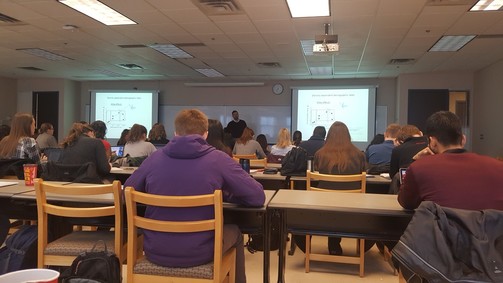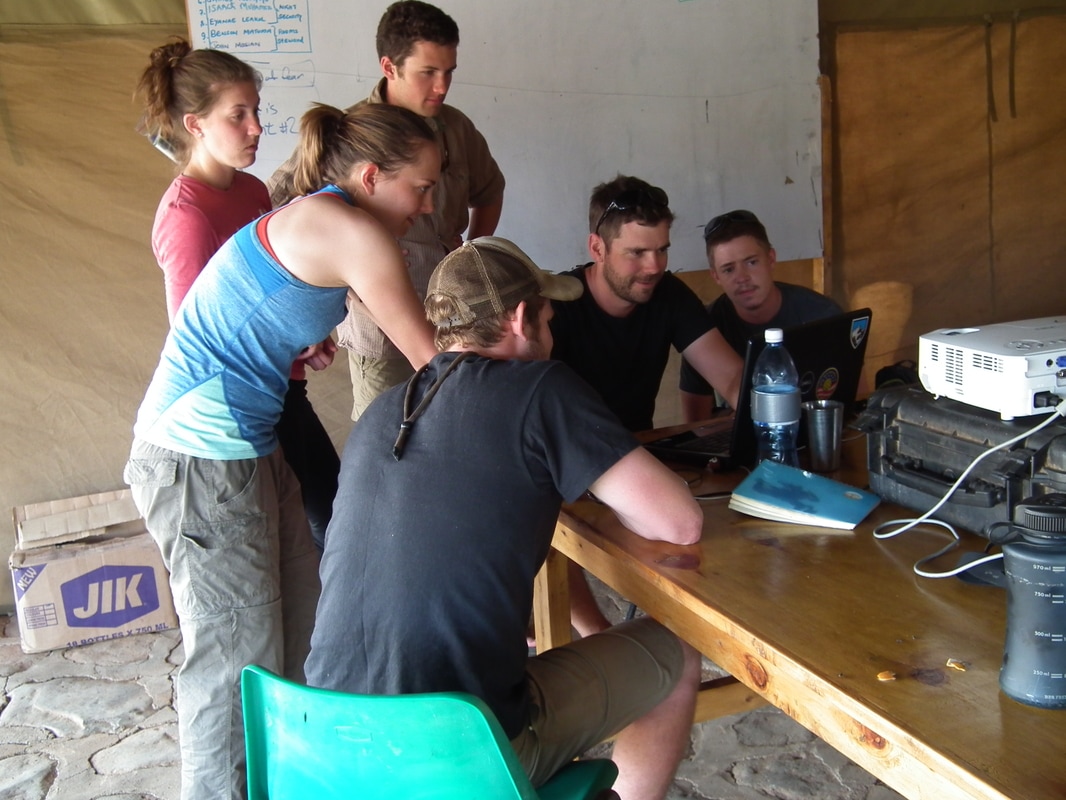Teaching: philosophy and course descriptions
 Students in Biol 306 get a healthy dose of Allee effects and carrying capacity on an early winter morning.
Students in Biol 306 get a healthy dose of Allee effects and carrying capacity on an early winter morning.
Last updated 30-May-2017
(1) Philosophy
For undergraduate, class-based courses, the goal of my teaching is to (i) help prepare students for the next step in their career path and (ii) create a space for students to explore their curiosity and interest in the subject matter. The key learning objective of my course, whether you are a biology major or not, is to increase the scientific literacy of all class participants.
(2) Lecturing style and approaches
For upper-level courses, we will rely on primary literature to understand the scientific process. Text books are an added expense, are often outdated, rely on the primary literature anyways, and can be purchased or loaned as you see fit. The assignments we will tackle are designed to give the broadest skill set to the most people. For example, this may mean learning how to write an NSERC CGS-M proposal, because many will do this type of work or something similar in their next steps. However, some people may never write an actual research proposal, but at some point in their career, they will be given an opportunity in 'pitch' an idea - be this in ecology, science, or some other endeavor. This research proposal is just one vehicle in which to develop the skill of the pitch. Many slides do not have text on them - my hope is that you will think about the content of the slide, what the underlying ecology means, and make notes that best reinforce your learning. Do not come to class expecting to transcribe text from slides for 80 min.
(3) Expectations:
Relationships suffer when expectations are not clearly communicated (i.e., message sent is not the message received) - and the relationship between teacher and student is no different. The following are things that students can expect in the courses I teach:
i) Respect: I expect that you will respect your classmates and instructors, and that you will feel respected by your classmates and instructor. If you feel otherwise, I hope you will communicate that to me. There is no room in my classroom for unkindness or disrespect from me to students, towards me from students, or among students.
ii) Vox alumni [the voice of the students]. I expect students to challenge the ideas presented in this course. This means asking questions, either in class or in office hours or both. Engagement is the means by which I match lecture material to exam questions and marking rubrics. The students who ask questions routinely have the best grades, as their thought processes, learning styles, and comprehension are easier to account for. Your voice is your power to literally change the course of your destiny. In addition, it is finding this voice to challenge ideas (your own, or those of others) that will propel you towards your next steps.
iii) Invitation for marks.Because you did well in other courses, it does not follow that you will do well in my course. Likewise, if you did poorly in other courses, it does not follow that you will do poorly in my courses. The course is an invitation to try your best, it is not an entitlement to a particular grade.
iv) Communication and healthy boundaries E‐mails will be answered on a first come, first served basis and every attempt will be made to respond within 5 working days. Do not expect a response outside of regular working hours, on weekends or holidays.
v) Expect to learn from mistakes We will evaluate midterms and other assignments together so that it is clear where and why you received the grade that you did, and how the language of the exam question could be better communicated.
(4) Things I do not have control over in my courses:
a) The schedule: 8am classes aren't fun for the non-morning person types, sorry. It is still important to show up on time - exceptions should be rare.
b) The room: Speaking volume and sightlines are tricky in some rooms. Sitting in the back of the room, while cool, maybe unhelpful for your learning. Rarely are all the seats near the front taken.
c) The number of students: This limits the types of assignments we can do. For larger classes (n=70 students), this means we aren't going to do individual, 20 page research papers, even though that would be a great way for you to learn. We have to find other, creative means to meet course objectives.
d) The course fees: Education is expensive, and that cost is a barrier to many people. I wish it wasn't so. In any event, I do not determine the cost of registering for any of the classes I teach. Together, however, we can help maximize the value you get for your course fees.
(5) Course descriptions
The Ecology of Animals, Biol 306 [Jan - April 2017]: This course focuses on the factors affecting the distribution and abundance of animals in nature. We will be exploring factors that operate at the level of the individual (behavioural adaptation, physiological adaptation), the population (habitat selection, dispersal and migration) and community (effects of habitat complexity and productivity on species diversity). How such factors affect the conservation status of threatened animals will also be explored. Assignments: 2 midterms, no final, group projects (observation/pitch, proposal, presentation). Class average = 79% .
(1) Philosophy
For undergraduate, class-based courses, the goal of my teaching is to (i) help prepare students for the next step in their career path and (ii) create a space for students to explore their curiosity and interest in the subject matter. The key learning objective of my course, whether you are a biology major or not, is to increase the scientific literacy of all class participants.
(2) Lecturing style and approaches
For upper-level courses, we will rely on primary literature to understand the scientific process. Text books are an added expense, are often outdated, rely on the primary literature anyways, and can be purchased or loaned as you see fit. The assignments we will tackle are designed to give the broadest skill set to the most people. For example, this may mean learning how to write an NSERC CGS-M proposal, because many will do this type of work or something similar in their next steps. However, some people may never write an actual research proposal, but at some point in their career, they will be given an opportunity in 'pitch' an idea - be this in ecology, science, or some other endeavor. This research proposal is just one vehicle in which to develop the skill of the pitch. Many slides do not have text on them - my hope is that you will think about the content of the slide, what the underlying ecology means, and make notes that best reinforce your learning. Do not come to class expecting to transcribe text from slides for 80 min.
(3) Expectations:
Relationships suffer when expectations are not clearly communicated (i.e., message sent is not the message received) - and the relationship between teacher and student is no different. The following are things that students can expect in the courses I teach:
i) Respect: I expect that you will respect your classmates and instructors, and that you will feel respected by your classmates and instructor. If you feel otherwise, I hope you will communicate that to me. There is no room in my classroom for unkindness or disrespect from me to students, towards me from students, or among students.
ii) Vox alumni [the voice of the students]. I expect students to challenge the ideas presented in this course. This means asking questions, either in class or in office hours or both. Engagement is the means by which I match lecture material to exam questions and marking rubrics. The students who ask questions routinely have the best grades, as their thought processes, learning styles, and comprehension are easier to account for. Your voice is your power to literally change the course of your destiny. In addition, it is finding this voice to challenge ideas (your own, or those of others) that will propel you towards your next steps.
iii) Invitation for marks.Because you did well in other courses, it does not follow that you will do well in my course. Likewise, if you did poorly in other courses, it does not follow that you will do poorly in my courses. The course is an invitation to try your best, it is not an entitlement to a particular grade.
iv) Communication and healthy boundaries E‐mails will be answered on a first come, first served basis and every attempt will be made to respond within 5 working days. Do not expect a response outside of regular working hours, on weekends or holidays.
v) Expect to learn from mistakes We will evaluate midterms and other assignments together so that it is clear where and why you received the grade that you did, and how the language of the exam question could be better communicated.
(4) Things I do not have control over in my courses:
a) The schedule: 8am classes aren't fun for the non-morning person types, sorry. It is still important to show up on time - exceptions should be rare.
b) The room: Speaking volume and sightlines are tricky in some rooms. Sitting in the back of the room, while cool, maybe unhelpful for your learning. Rarely are all the seats near the front taken.
c) The number of students: This limits the types of assignments we can do. For larger classes (n=70 students), this means we aren't going to do individual, 20 page research papers, even though that would be a great way for you to learn. We have to find other, creative means to meet course objectives.
d) The course fees: Education is expensive, and that cost is a barrier to many people. I wish it wasn't so. In any event, I do not determine the cost of registering for any of the classes I teach. Together, however, we can help maximize the value you get for your course fees.
(5) Course descriptions
The Ecology of Animals, Biol 306 [Jan - April 2017]: This course focuses on the factors affecting the distribution and abundance of animals in nature. We will be exploring factors that operate at the level of the individual (behavioural adaptation, physiological adaptation), the population (habitat selection, dispersal and migration) and community (effects of habitat complexity and productivity on species diversity). How such factors affect the conservation status of threatened animals will also be explored. Assignments: 2 midterms, no final, group projects (observation/pitch, proposal, presentation). Class average = 79% .

